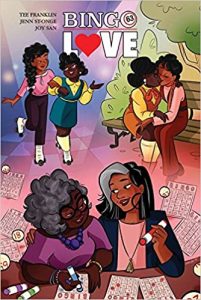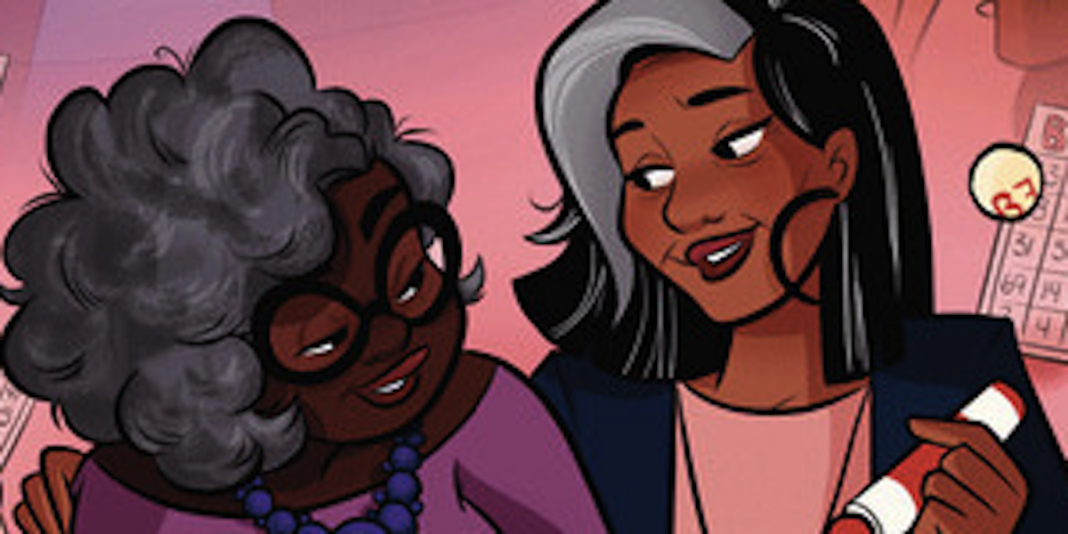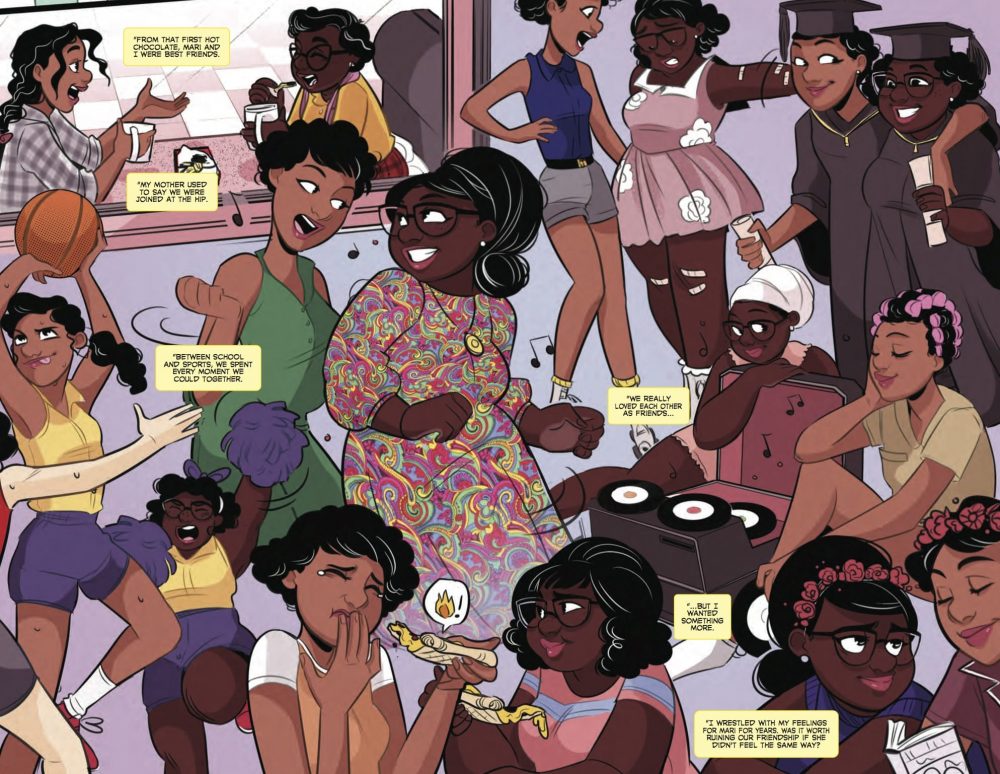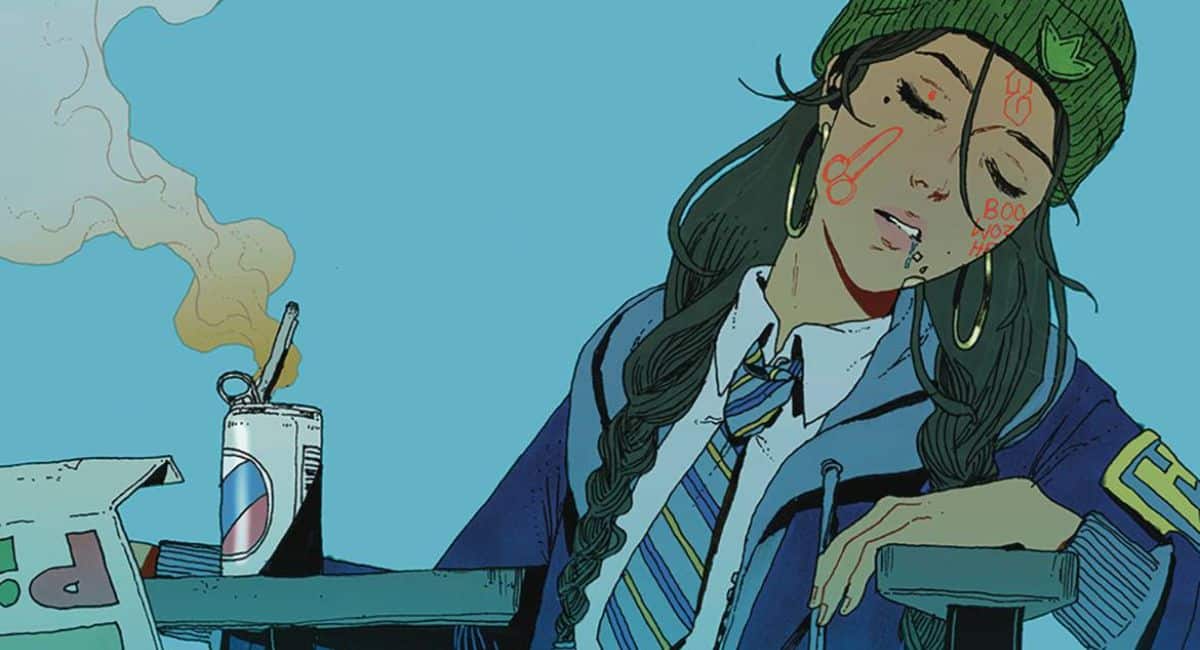Welcome to Queerness in Comics, a bi-weekly column by Avery Kaplan that will explore queer representation and themes in comics. This week, Avery is exploring Bingo Love, originally published in 2018.

Art: Jenn St-Onge
Colors: Joy San
Letters: Cardinal Rae
Publisher: Image
Bingo Love begins in the future: 2038, at the Jenkins Home for Seniors. On the first page, we see an unnamed character visit Hazel in the seniors home. The visit serves as an introduction to the story, as the girl tells Hazel that her parents have kicked her out after discovered that she was gay. In response, Hazel shares her story, which begins in 1963, when she had been in school.
At only thirteen years old, Hazel met the love of her life, Mari. While the two girls are fast friends, Hazel isn’t satisfied, and wants something more romantic in nature out of their relationship. Hazel is hesitant because she’s worried that if she reveals her true feelings to Mari, it will compromise their friendship, which she considers to be invaluable. However, she eventually finds it impossible to resist giving Mari a kiss, and she finds that her attraction is reciprocated.
However, while Mari may reciprocate Hazel’s feelings for her, Mari’s family is not so understanding. When Mari’s grandmother catches the couple kissing in front of the house, she drags Mari into the house and tells Hazel not to come around anymore. This leads to Hazel’s family discovering the truth about her relationship with Mari, too, and Hazel is told that she has compromised the family’s reputation by engaging in “perversion.” Worse still, Mari’s family takes her out of school, so the couple doesn’t even get the chance to see each other when they are each away from their respective families.
Desperate to see Mari, Hazel sneaks over to her house and climbs a tree in order to speak to Mari through her window. In many romance stories, this is the point at which Mari would be convinced to leave with Hazel. However, that just isn’t how this story goes: Mari tells Hazel that if the two of them were to run away together, her family would disown Mari. As a result, this is nearly the last time the couple saw each other.
After they part ways, both Mari and Hazel go down their own respective paths. Each of them ends up marrying a man and starting a family, with their queer relationship becoming a part of their past that they don’t really speak about. Hazel finds her life “reduced to being a housewife,” and to escape the tedium of her chores, she imagines she is designing clothing for Mari to wear. Eventually, Hazel has become a grandmother, and while her physical relationship with her husband is essentially non-existent, she takes solace in the joy her grandchildren bring to her.
However, just when Hazel has resigned herself to a life as a wife who isn’t really attracted to her husband, her love story gets a little more complicated when she is reunited with Mari at a Bingo game (the couple recognizes each other in a particularly memorable moment, resulting in a splash page depicting their romantic reunion).
What makes Bingo Love particularly interesting is how it deals with the fallout that comes from this reunion. While there is virtually no question about whether or not Hazel and Mari still have feelings for one another, the question of how they will choose to proceed with the effect their relationship will have on their respective families is a major consideration.
At first, the reactions are less than desirable: in particular, Hazel’s husband does not take it well, and screams at her to the point that Hazel must tell him to spend the night on the couch. The next day, he continues to react with anger and tell her that he feels betrayed. It’s a complicated situation, and Hazel feel caught between the life she has built for herself and the life in which she belongs.
Ultimately, Hazel recognizes that her deepest desire is to be with Mari, and accepts that in order to make that a reality, she must divorce her husband. While he had had difficulty accepting that his wife was leaving him at first, he ultimately recognizes that a divorce will prove beneficial for everyone. And now free of the responsibilities that they had been tied into due to their marriages, Mari and Hazel are free to begin a new life together.
While everyone knows the story of the two next-door neighbors who fall in love as teenagers and remain together for their entire lives, we aren’t all so lucky as to stumble into true love just outside our front door. For some queer people, it can be necessary to take part in the wrong kind of relationship before finding where we belong. These types of stories are just as valid as any other story, and Bingo Love tells one such tale incredibly effectively.









